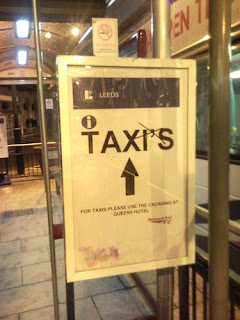 |
| A sign for a "night club" in Costa Rica. Read this post to see how "night clubs" in Spanish and "nightclubs" in English are different! |
There's a common English phrase that I like: "With friends like these, who needs enemies?"* It means that sometimes the people who we think are our friends, are the people who hurt us most. This can be applied to language learning when talking about cognates, or specifically false cognates.
Cognates are words that look identical or very similar in two languages. For example, the Spanish word "actor" is identical to the English word "actor," and their meanings are the same. Only the pronunciation is a little different. So, we could say that "actor" and "actor" are cognates. (Click here for a nice list of many English-Spanish cognates.)
False cognates --also called "false friends"-- are pairs of words that look similar, but in fact have different definitions and meanings. One example that causes problems for a lot of people is the word "once." In Spanish, once means "eleven," but in English, "once" means "one time." Another example is "actual." In Spanish, actual means "current," but in English, it means "authentic" or "real."
I notice my students getting confused by false friends very frequently. As you know, I already have a Common Errors section in this blog, but since false friends are quicker and more specifically related to vocabulary, I decided to start a False Friends page on this blog. I'll post more of these false friends and their explanations occasionally, but if you want to have a quick list now, you can check different extended lists here, here, and here.
So, here's our first False Friend: "night club" in Spanish vs. "nightclub" in English:
| False Friend: | ||
| This SPANISH word... | Looks like this ENGLISH word... | ...but they are DIFFERENT because... |
| "night club" | nightclub | Obviously, "night club" isn't really a native Spanish word, but it's used frequently, at least in Costa Rica. BUT, there's an important difference. If you go to a night club in Costa Rica, you're going to what's called a "strip club" in English, where strippers take off their clothes for money. In English, a "nightclub" is a place that normally serves food and alcohol in the evenings, and usually provides a place to dance. It's very similar to a "disco" or a "dance club." If you go "nightclubbing," it means you go out dancing in the evening.** |
I'll try to post more False Friends in the future, and you can find them by clicking on the "False Friends" tab at the top of this blog. If you have any questions or suggestions for additional False Friends, I'd love to hear from you.
Thanks very much for reading, and have a great day...or night; and if you're going to a night club, be careful!
*Apparently, this phrase may have originally come from German, since there's also a similar phrase in German: Mit solchen Freunden braucht man keine Feinde mehr.
**"Nightclubbing" is also the name of a song by Iggy Pop.





